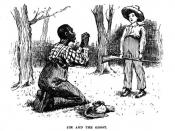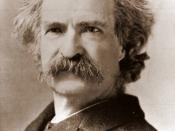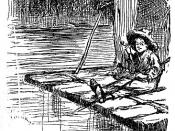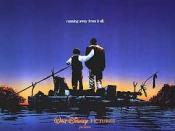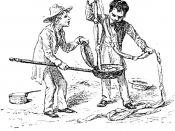The Adventures of Huck Finn is the most controversial novel in American History. This is partly due to it's multi-level nature. It serves as an enjoyable book for young readers, while boggling the minds of the most intellectual literary critics of our time. Mark Twain brings up the question of racism, while the racial slurs within brings the book itself up for debate. Twain often parallels certain ideas throughout his novel, and at the same time, the feelings he invokes in readers parallel the themes throughout book. As far as the novel's creation, there's question of whether it was born prematurely or if it has outlived its own time. The artistry of this masterpiece spans from the hyper-complex ideals of humanity to the microscopic infrastructure of its vernacular. Whether it is read for its underlying morality, its engulfing tale of adolescence, or for its inextricable melding of it all, Huck Finn is truly a work of genius.
For many young readers, the excitement of boyhood adventures has an immediate appeal. They dream of being on the run with Huck and Jim, living on a raft and exploring the ins and outs of the Mississippi. They can look up to the cunning and creativity of Huck's escape from the cabin and his faked death. Also, they can relate to the mischievous and curious nature of Tom. His ritualistic detail incorporated into the jail-break sparks an interest in their aspiring minds. If nothing else, Huck Finn is an extremely entertaining way to encourage young readers. And perhaps the novel will one day become a symbol of their innocence, rekindling their youthful spirits. As they re-read the tale of boyhood heroics, those feelings of nostalgia will parallel, and enhance the adolescent themes of the book.
Beyond simple entertainment, Twain's mini-plots provide important life lessons to the reader at any age. Within the individual chapters, the characters are often put into situations that beg the reader to probe into their own moral standards. Through these thought provoking stories, a source of endless rewards can be found. All it takes is a mind full of insight and question. For example, I found the story of Jim's deaf daughter to be particularly saddening. I asked myself "ÃÂwhy?' Personally, I found the most important reason was to humanize Jim. When reading that story, I immediately empathized with his pain. But even within this fragment of a chapter, there are so many ways to absorb Twain's message. I imagine that some fathers who read this book will cherish their children a little bit more. Some will be thankful for modern day medicine. Others will relate to the daughter and try to be understanding and forgiving. However it is interpreted, these mini-lessons occur all over the book, and if they are pieced together, they will reveal an even greater idea of Twain's.
Jim's humanity is continually reinforced throughout the novel, thus helping the attentive reader understand Twain's use of racial slurs. At first glance, even Huck seems to take the occasional stab at his friend's back. Such as the case when Aunt Polly inquires as to whether anyone was hurt when the the alleged cylinder-head blew out. Huck replies, "No'm. Killed a nigger."ÃÂ Is Huck saying that his friend Jim is less than human? Well, yes and no. At surface level, Huck is making conversation out of thin air. He's grabbing for ideas and one of the first things he thinks of is showing his disrespect for slaves; much in the same way of complaining about the government (parallel to Huck's dad). Huck knows that he can say this without believing it. After all, his only purpose for being there is to save Jim.
If Twain is constantly giving the reader reason to feel sorrow, admiration, and respect for Jim, why, then, is he such a secondary character? Through all of Huck's adventures, Jim is popping in and out of the picture, and he becomes, as David L. Smith puts it, a "side-kick."ÃÂ Perhaps Twain doesn't want Jim to be equal to Huck. He could have easily given Jim the appropriate role of a friend, or partner in crime. But he doesn't. In combination with the admirable qualities, worthy advice, and over-the-shoulder presence in the novel, Jim is given the role of a father figure to Huck. Not only does he replace Pap, he does a better job. Jim confesses his anguish over the one mistake he made with his daughter, and shows his longing to be back with his family. Huck, who ran away from a horrible father, looks to Jim to take his place. They need each other. Why doesn't Twain come right out and say it? He was restricted by the way of the times. Even though he sought to challenge the zeitgeist, he knew his where his boundaries were. And and is was, his critique of racism already put him out on thin ice. To a certain degree, he had to trust the reader to dig deeper and discover the unwritten word.
Is it easy, however, to go beyond the intended interpretation, and yet, so difficult to know where the line is crossed. Since certain characters symbolize different ideas, it's possible to interpret any of their actions as a statement on that particular idea. As with Tom Sawyer, he was raised civilly and comes to signify the affects it has on human logic. When he wants to apologize to Jim, he gives him forty dollars. Whereas Huck feels like an apology cannot be bought. Twain is illustrating the interaction between nature and society. Huck, the outsider who's looking in on this interaction, reveals some of Twain's comments. Learning mannerisms and wearing uncomfortable clothes is wholly unnatural for Huck. Twain is pointing out nonsense of it all. And at the conclusion of the novel, Huck's final goodbye's piece together all of Twain's ideas. But what do they mean. "I been there before,"ÃÂ he says. Is that saying that civilization, no matter how primitive, has always been a part of humankind, and that modern day society is trying to cover-up, or clothe, all that reminds humans of there animalistic nature. And what about the fact that Huck, the symbol of nature, is going to be civilized in the end? Is Twain predicting the extinction of the uncivilized man? *note* until I figure out a way to tie-in the following idea, the conclusion will remain unfinished : ( Some of Twain's most delicate craftsmanship is hidden below surface level. Even within the most basic dialogue, there is a microscopic infrastructure working to maintain the flow of each sentence. The use of a southern vernacular in Twain's writing helped to invent a realistic and unique writing style...
